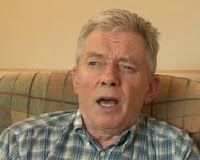 |
| Speech Pathologist Mentors can be Friends |
Friend and Mentor Armando Cruz
(A dog's friend also!)
A Good Speech Language Pathologist Can Be Friend and Mentor
This article is different. Speech Pathology Mentors are those who communicate with you. They share information, they teach, advise, and express events of their lives that may help those with whom they speak. The Mentor I wish to write about today is a man of varied talents, and one who manages people. He is a physicist, salesman, corporate sales manager, husband, father, RVer, patron of the cinema, and just a friendly guy! He is very likable; even canines like him. He always has a pocket full of dog treats, even when he is wearing formal work attire!Why should this article be about this mentor and fine human being? He is friendly, and always shares what he has: food he prepares, cigars and coctails occasionally consumed. He is always finding something that he thinks you would need or like when he goes shopping. Almost every time he visits, he comes bearing gifts for everyone; including (Jackie the dog). Quite a remarkable person, isn’t he? This person is always chuck full of information that he thinks might be beneficial for you, whether it is about finance, business, cooking, food, motorhomes (of which we have recently purchased), and the proper care and maintenance of them.
What is one of the most amazing things about having a Mentor and friend? The answer is that one’s life is greatly enriched by having a person such as Armando in your life. Learning occurs; communication is constant, and a truly meaningful relationship ensues. His excellent qualities just “rub off” on you. You also notice changes in the self, which include new beliefs, behaviors and attitudes that seem to have gotten in your head by osmosis.
What then happens other mentor-like relationships can develop. They develop because you have learned how valuable it is to have other people in your life. You soon develop new behaviors that are borrowed from others, like striking up conversations, and sharing what you have. What immediately happens is they find ways of sharing what they have with you, and the enrichment of your life and theirs increases. You find yourself changing and growing as a person, and stepping out of the old way of being.
Mentoring occurs in so many areas of life if you allow it. It first requires making a connection. A simple Hello will do! A simple comment about what you observe about others helps strike up the conversation. Many do not practice these little pointers, and life can be rather lonely and isolated. It does not have to be that way. I am speaking to those of us right now who are able to communicate, but choose not to when around others whom we do not know. Thank goodness for the internet for some who can not get out.
Those who have speaking difficulties tend to be isolated in the shadows, or what I have referred to as being in the closet of life. They need friends also. They need to speak with others and interact. For the verbal interaction in communication is one of the most treasured processes in living and can bring great joy. That is why The Teaching of Talking was written. It is a book about how to help your loved one to speak in single words, phrases, and sentences, as long as they are stimulable. Stimulability is whether the person who has difficulty speaking can mimic or imitate vowels, words, phrases or sentences. Caregivers and family members are learning how to stimulate language at at home, and helping the person with difficulty speaking step away from the sheltered home environment of speaking to the external places in the community where they can communicate with others, whether cues are or are not needed.
Find a Speech Pathologist Who Can Be Friend and Mentor:
Apraxia Speech Therapy
The point here is to take the step of communication interaction rather than not. People can be understanding and interactive when methods of speech and language stimulation are employed with the caregiver and person who has difficulty speaking. Life can be so much better when a family member or caregiver learns how to stimulate language. When that occurs you are no longer dependent on outside sources, computers, or software to stimulate speech and language. You can do it anywhere, and you and your loved one can connect with others and say what you darn well please! Contact a therapist to find out if you or a loved one could benefit from apraxia speech therapy mentoring.





